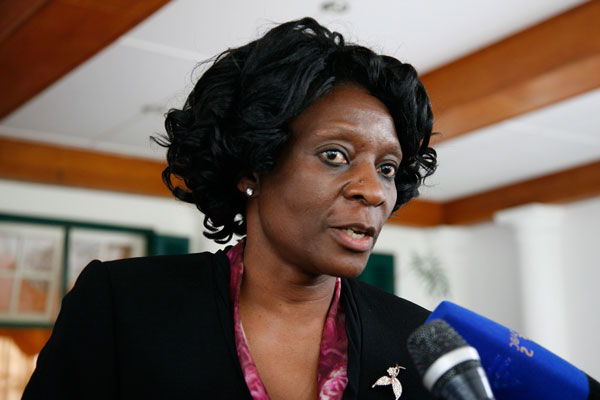By Farayi Machamire
Thousands of doctors and nurses who will be on duty on 2018 election day will be unable to cast their vote, Zimbabwe Electoral Commission (Zec) confirmed yesterday.

Zec chairperson Rita Makarau (pictured) made the declaration during a meeting with medical practitioners who sought to discuss ways in which they can exercise their voting rights while on duty in the 2018 general elections.
Amendments in Section 22A of the Electoral Act introduced the polling station-based voters’ roll in which one can only vote at one specific polling station where his or her name appears on the voters’ roll, unless where exceptions apply.
“If you are not at home, you can’t vote . . . the devil is in the law, change the law . . . We are speaking the same language and we have been making the same cry because even ourselves, we will be away from home,” Makarau said.
“I maybe observing elections in Matabeleland South but I am registered to vote here (in Harare), which means if I am away from home, I will not be able to vote not because I don’t want to vote or Zec does not want to facilitate, but the lawmakers did not see that gap.
“So we have been making that cry for the law to be changed. It doesn’t only affect doctors but even police officers,” Makarau said.
Executive director of the Zimbabwe Association of Doctors for Human Rights (ZADHR) Calvin Fambirai had told Makarau the health professionals felt voting privileges had been extended to the army and the police for purpose of enhancing their participation in electoral processes but not to the health sector.
“The argument is essentially that the health sector, particularly doctors and nurses, have been placed on ‘essential services’ category as with the security forces, that is the army and the police,” Fambirai said.
“We believe not much has been done to extend the same privileges to medical practitioners as has been extended to the army and police for purpose of enhancing their participation in electoral purposes. Special facilities such as establishment of registration centres and polling stations and postal voting are granted to the security forces.
“Hospitals and other notable public institutions do not scale down services because there is an election. In fact, the history of our elections which have been largely characterised by violence even call for health professionals who are on duty, on call and alert for the purposes of not only attending to victims of politically-motivated violence but to the general provision of care to ailing Zimbabweans.
“Therefore, increasing access to polling stations will assist in preventing interruption of service provision by health professionals in exercising their right to vote as guaranteed in Section 67 of the Constitution.”
The meeting involved Zimbabwe Association of Doctors for Human Rights (ZADHR) together with the Zimbabwe Hospital Doctors Association (ZHDA) and the Zimbabwe Nurses Association (Zina), which represents 14 200 State nurses.
There are 1 500 State doctors.
But Makarau said the health professionals will have to forfeit their right to vote just like 200 000 Zec polling officials who would be stationed away from their wards on polling day.
“We deploy polling officers at each polling station and each station requires not less than seven officers. On polling day, we deploy not less than 70 000 polling officers and not all can be deployed at home.
“So we are losing 70 000 votes . . . It’s not you alone but hundreds of thousands of votes will be lost, so you can assist by petitioning Parliament.
“It’s not an administration arrangement but it’s a legal gap which nobody seems keen to fill,” Makarau said.
The medical practitioners were also lobbying for detained patients on election day, displaced from their ward due to illness, to be given the right to vote through postal vote.
Makarau also shot down that demand.
“Unfortunately, again, you can’t make use of postal vote, it’s only for diplomats . . . we don’t have a problem of administering it to everybody, but if only the law can be changed,” Makarau said.
“The devil or the problem is in the law and not in the administration.” Daily News






